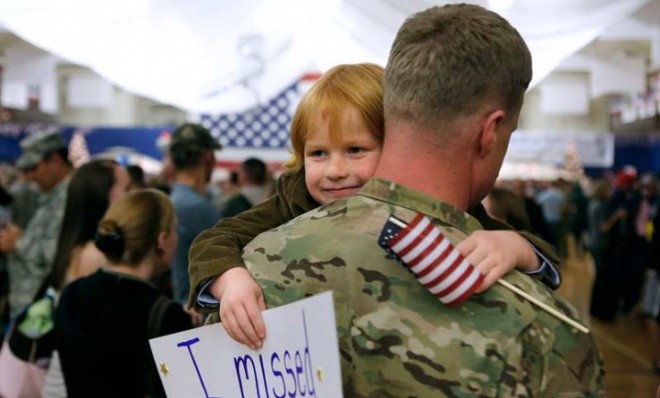Americans should spend more money on veterans
Supporting our troops cannot begin and end with the mere act of waving a flag or wearing a yellow ribbon

A free daily email with the biggest news stories of the day – and the best features from TheWeek.com
You are now subscribed
Your newsletter sign-up was successful
It doesn't matter whether you agree or disagree with President Obama's strategy on Afghanistan, because the president has made his decision. After more than a decade of war, major U.S. military operations are coming to an end. Many will welcome this development; years upon years of war have wearied America. But while this exhaustion is understandable, it's also insignificant. Since the fall of 2001, while we spent money in malls, our fellow citizens were giving everything abroad. Now these veterans need our support.
While their fortitude is incredible and their military successes undeniable, after multiple combat deployments, many veterans face serious challenges when they come home. In 2012, 349 service personnel took their own lives, a 16 percent increase over 2011, and more than were killed in action. We must stop this national catastrophe. But how?
First, we've got to increase public awareness concerning the mental health challenges that our veterans face. If we can, you can bet we'll see a rise in donations to NGOs focused on the mental health of vets, like The Soldiers Project, the Coming Home Project, and New Directions.
The Week
Escape your echo chamber. Get the facts behind the news, plus analysis from multiple perspectives.

Sign up for The Week's Free Newsletters
From our morning news briefing to a weekly Good News Newsletter, get the best of The Week delivered directly to your inbox.
From our morning news briefing to a weekly Good News Newsletter, get the best of The Week delivered directly to your inbox.
We must recognize and build upon the work of the Department of Defense, which has a network of services including the U.S. Marine Corps "D-Stress" helpline, the U.S. Army's "Shoulder to Shoulder" network, the cross-service "Total Force Fitness" program, and the DoD's "Suicide Outreach website. We need to ensure that funds are prioritized to advance these efforts.
Unfortunately, it isn't only in the field of mental health that veterans need increased assistance. When it comes to veteran health care services, our system is woefully inadequate. Many veterans are forced to endure terrible delays in accessing the support and benefits to which they are entitled. NGOs like the Resurrecting Lives Foundation (which focuses on assisting veterans who are suffering from traumatic brain injuries) are helping to address these challenges. But the federal government can and must do more. The Department of Veterans Affairs (VA) is over-burdened by a stifling bureaucracy, a backlog of cases, and a complex benefits-eligibility process. Facing this reality, the president and Congress should take two immediate steps. First, allocate extra resources to expedite support/benefit applications (hiring additional staff if necessary). Second, simplify the rules regarding eligibility for benefits.
We also need to improve support for veterans who are re-entering civilian society. Again, thanks to the dedicated work of NGOs, we already have a powerful template for action.
We need to ensure that veterans accused of criminal offenses are able to secure responsive justice. We should increase the provision of Veterans Treatment Courts. These courts provide justice that is direct and fair, but justice that is also cognizant of the unique challenges veterans face. The objective here is not to excuse crimes, but to instead guide veterans away from recidivism and towards positive social engagement.
A free daily email with the biggest news stories of the day – and the best features from TheWeek.com
We must also do more to help veterans find post-service employment. In 2012, veteran unemployment stood at 9.9 percent, considerably higher than the 2012 national average of around 8 percent. For veterans between the ages of 18 and 24, unemployment in 2012 was at the staggeringly high rate of 23 percent. This is utterly unacceptable.
We need to ensure that private businesses are given greater support to hire veterans. (Walmart's pledge to hire vets is a great start.) A 2012 report from the Center for a New American Security offers a number of important suggestions about how to do this. The key: Employers must be able to engage with the DoD in a more open and collaborative way on the specific needs and abilities of veterans.
Open collaboration should be at the core of our national strategy to better support veterans. So let's be honest. These reforms will take money. We're talking billions of dollars every year. But considering what we spend on defense procurement — tens of billions every year — we can and must find the money.
In recent years, the highest-ranking civilian and military leaders in the DoD have both warned that America's civilian population is increasingly divorced from our military. They are right. Supporting our veterans cannot begin and end with the mere act of waving a flag or wearing a yellow ribbon. We need active-service and post-service veterans who have the opportunity to flourish in society.
More than 6,600 American servicemen and women have given their lives in Afghanistan and Iraq. To honor their memory, the least we can do is support their brothers and sisters who have returned home.
Tom Rogan is a conservative writer who blogs at TomRoganThinks.com. Follow him on Twitter: @TomRoganTweets.
Tom Rogan is a conservative writer who blogs at TomRoganThinks.com.